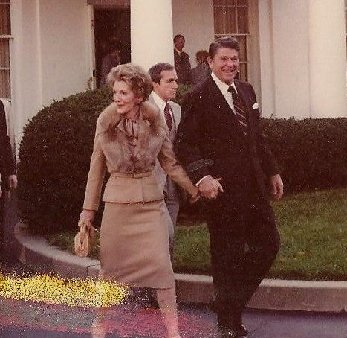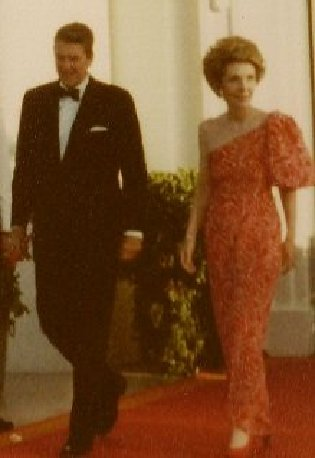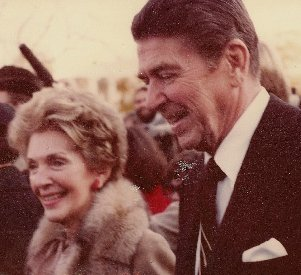
As the media breathlessly covered last night's Academy Awards by heralding the talents at the heart of the commercial film industry, it's odd how the earlier career of President Ronald Reagan was either belittled or ignored during the recent coverage of his centennial.
Blue State commentators fawn easily when politically-minded actors rally behind issues but in his moving from the profession into politics, the 40th President was dismissed as "just an actor." Their Red State counterparts who rail against "Hollywood values," made no acknowledgement of how much respect Reagan had for the entertainment industry.
In Hollywood, even those who opposed him politically returned the honor in 1981 when the board of the Academy of Motion Pictures Arts unanimously decided to postpone the March 30 Oscar ceremony hours before it was scheduled to begin, as word reached them of an assassination attempt on the recently-inaugurated President moments after it occurred that day. This had only happened twice before; in 1968, following Martin Luther King's assassination and 1937 due to unusually heaving flooding in Los Angeles. By strange coincidence it was that heavy flooding which had prevented then-radio announcer Reagan from covering Cubs training on Catalina Island, the reason he'd come to Los Angeles, and instead meet an agent, make his first screen test and get cast in his first film.
Driving his convertible onto the Warner set for his first day of work as an actor, Reagan recalled, "was a fantasy come true." Sustaining viability in the fiercely competitive industry, however, requires more than looking and sounding the part. Memorizing entire scripts and rapidly adapting to portions that are changed in the moment, studying, conceptualizing, enacting and then convincing others of a character's motive through facial expression and body language, while responding to those of fellow cast members. Not every actor can lengthily quote Shakespeare verbatim but those who are successful have a degree of that ephemeral "emotional intelligence" apparent in many other professions.
In Washington, as in Hollywood, there is no substitute for substance. Business training, policy experience, managing advisors, enacting a vision are all part of a President's responsibility. Yet in the industries of both towns, style is also used symbolically for substance; the great proof of this is the sustainability of the "photo op" for nearly a century through all forms of evolving technology. Being "presidential" is an act that requires personal engagement that also translates simultaneously to still and motion pictures. The far subtler arts of communicating, empathy, convincing, assurance, and negotiating are crucial to a successful President. Washington, FDR, JFK, Clinton, even McKinley had it. So did Reagan. Professional acting experience is an obvious and enormous advantage.
On several occasions I closely observed those skills in Reagan. I started as a George Washington University journalism student at the time of his election. To fulfill a "local current event" class assignment, I naively badgered the Carter Press office into credentialing me so I could cover the first post-election meeting between Carter and Reagan on November 20, 1980. While soon apparent there'd be little hard news in his post-meeting remarks, Reagan's persona made it an event worth covering. I put down my pencil to instead take snapshots with my clunky old Pentex. 
With every few steps Reagan absorbed a succeeding layer of people surrounding him, never losing his graceful gait, striding like a victorious sportsman: aides at the West Wing door at he emerged from it, security on its small, circular driveway, a thick gaggle of reporters near the Press Room. As he crossed the North Lawn to the gate, out onto the sidewalk and across the street to a Lafayette Square guesthouse where he was staying, a curious mass of the general public soon piled around, thickening and slowing the entire entourage. Reagan kept his balance, his gaze fixed ahead but never directly at those right in front of him, self-contained but not remote. He had no upset or hesitation, despite everyone grasping for his hand and calling out his name, to which he occasionally half-raised his arm in acknowledgement, with a nod and blink. It was all gesture as choreography. I'd seen pictures of him waltzing on a dance floor, and read of his aquatic skills as a lifeguard, but I wondered how this politician learned a pacing so assured that it adjusted those around him accordingly.

To read more of this story and see previously unpublished photographs, go to: carlanthonyonline.com.
I'd kept my camera going throughout all this, serially capturing every few seconds and when I later studied them, I recognized how the presence of his wife Nancy, whose hand he held throughout the tumult, was something of counterweight ballast. When they initially exited the West Wing, it was Nancy who turned in response to yells from the press, held at bay some distance. Without so much as a tug or whisper from her, he detected her attention having shifted and then turned in the same direction. Smiling, gamely in lockstep, they sailed over to the press.
Cameras gnashed the moment they poised in place, their dual profiles instinctively reposed in the bath of white flashes. Then came a discordant shrill of questions at all decibel ranges, about the leader of South Korea, the American hostages held by Iran, rising unemployment, and economic reforms. He answered them all without responding to any. Modulating his voice with a timbre of reverence for the institution he would soon inherit, Reagan articulated an appropriately abstract statement that might have seemed scripted and memorized had it been possible timewise to do either. His words and gestures telegraphed an unmistakable message, humble yet with gravitas, that it would be presumptuous to speak yet with the full command of President, cocking his head in a vague suggestion of hesitation. Pausing between every few of his sincerely expressed words of gratitude to Carter for the briefing which would now help him to formulate his own policies seemed to imply all would be well in this transfer of power.
As he spoke his last few words he had begun to shift his head towards Nancy, so that as he finished he had led the press to likewise focus their questions on her. Well, she briefly piped up, it was a big house and she'd probably need a second look around to decide how she'd configure their life there. She then turned her full face back on her husband's.
Another, more intense set of questions barraged Reagan and he nearly found himself trapped. Nancy kept her gaze intently on him and continued to squeeze his hand. After a brief beat of hesitation, he raised his arm and very distinctly pointed out towards no particular, distant point, suggesting some momentarily scheduled commitment. He smiled, she smiled and they were off, turning now to walk to the gate and beyond.
In various capacities over the next few years (from a college job in the Executive Offices of the President to freelance reporter to itinerant speechwriter to Mrs. Reagan), I had the chance to similarly observe Reagan in the diverse responsibilities of the presidency as were seen by the press and public. In each one of these, his physicality, facial gestures and speaking tone were dramatically different, truly a variety of roles to be convincingly performed for public consumption.
Just two months later, as a hired writer for the Inaugural book, I covered his 1981 Inauguration Day events, able to watch him closely at the Washington Hilton ball. Of course, the lines he repeated there proved to be the same ones he quipped at the many other crowded hotel room balls he made the rounds of that night. He was louder with the pride of victory as he cracked to his faithful followers about now having to live in "public housing," playing the full-fledged Partisan Leader, acknowledging familiar faces with a shout behind his hand or pointing and waving to individuals he spotted. Some years later, doing freelance pieces for various feature outlets, I observed and snapped away as he and Nancy, in black tie and gown, sauntered majestically out along the red carpet of the North Portico to await the arriving Australian Prime Minister for a state dinner. Reagan was focused but obviously relaxed in this role of National Host, warmly clasping the hands of his guests, nodding long and deep in the exchange of polite pleasantries, gingerly guiding them into the proper place dictated by protocol. He smiled broadly to the press, huddled across the drive on a stand, turning to wave before entering back into the house.
To read more of this story and see previously unpublished photographs, go to: carlanthonyonline.com.